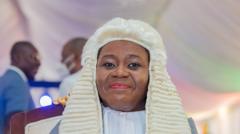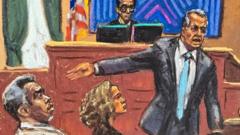The recent suspension of Ghana's chief justice, Gertrude Torkornoo, has ignited significant political backlash, with opposition leaders claiming it undermines judicial independence and constitutes an "abuse of power."
### Controversy Erupts Over Suspension of Ghana's Chief Justice

### Controversy Erupts Over Suspension of Ghana's Chief Justice
**Opposition Parties Denounce Executive Power Abuse Following Unprecedented Judicial Action**
Ghana's political landscape has become increasingly turbulent following the historic suspension of Chief Justice Gertrude Torkornoo, a decision that marks a troubling first in the nation’s judicial history. Opposition Members of Parliament have vocally criticized President John Mahama, alleging that the suspension is an attempt to fill the judiciary with justices aligned with the ruling National Democratic Congress (NDC).
Torkornoo, who was appointed in 2023, was removed following the filing of three undisclosed petitions against her. This unprecedented action has raised eyebrows among both political leaders and the public. Proponents of the suspension have defended it as a necessary measure to cleanse the judiciary, while opponents are labeling it a "judicial coup" and a flagrant misuse of executive authority.
In a statement, the Presidency indicated that the Chief Justice's suspension was put in place to facilitate an investigation into the allegations, although the nature of the charges has yet to be revealed. Two additional petitions against Torkornoo emerged after her suspension, fueling further discord.
Former attorney general Godfred Yeboah Dame described the move as a "complete charade," and warned that it represents a severe attack on judicial integrity in Ghana. Critics point out procedural issues, noting that President Mahama acted prematurely by suspending her before the Supreme Court resolved pending lawsuits challenging the legality of the suspension process—lawsuits that questioned the president's rightful authority to act without prior notice of the petitions.
Despite the controversy, some supporters, including Dr. Tony Aidoo, argue that the president's actions are justified, viewing them as necessary for maintaining the integrity of the judiciary. Aidoo contends that if a judicial figure has compromised the court's function, decisive action is warranted.
Historically, Ghana's chief justices have either retired or completed their terms without such drastic measures taken against them. The grounds for removal from office in Ghana's legal framework include incompetence or misbehavior, which remains to be substantiated in Torkornoo's case—a matter currently under investigation by a five-member committee.
As the situation unfolds, many are left questioning the future of judicial independence in Ghana and the true motives behind the suspension.
Torkornoo, who was appointed in 2023, was removed following the filing of three undisclosed petitions against her. This unprecedented action has raised eyebrows among both political leaders and the public. Proponents of the suspension have defended it as a necessary measure to cleanse the judiciary, while opponents are labeling it a "judicial coup" and a flagrant misuse of executive authority.
In a statement, the Presidency indicated that the Chief Justice's suspension was put in place to facilitate an investigation into the allegations, although the nature of the charges has yet to be revealed. Two additional petitions against Torkornoo emerged after her suspension, fueling further discord.
Former attorney general Godfred Yeboah Dame described the move as a "complete charade," and warned that it represents a severe attack on judicial integrity in Ghana. Critics point out procedural issues, noting that President Mahama acted prematurely by suspending her before the Supreme Court resolved pending lawsuits challenging the legality of the suspension process—lawsuits that questioned the president's rightful authority to act without prior notice of the petitions.
Despite the controversy, some supporters, including Dr. Tony Aidoo, argue that the president's actions are justified, viewing them as necessary for maintaining the integrity of the judiciary. Aidoo contends that if a judicial figure has compromised the court's function, decisive action is warranted.
Historically, Ghana's chief justices have either retired or completed their terms without such drastic measures taken against them. The grounds for removal from office in Ghana's legal framework include incompetence or misbehavior, which remains to be substantiated in Torkornoo's case—a matter currently under investigation by a five-member committee.
As the situation unfolds, many are left questioning the future of judicial independence in Ghana and the true motives behind the suspension.





















